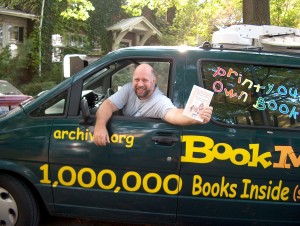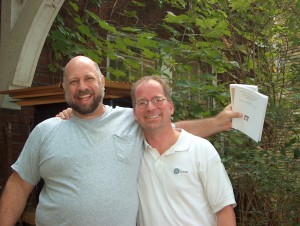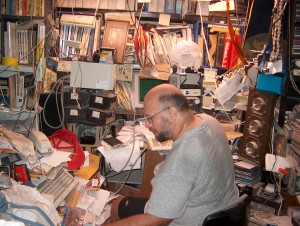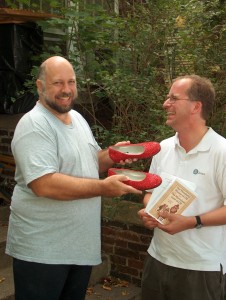




A dear friend and an inspiration unfortunately died yesterday. Washpost obituary.
He dedicated his life to getting books to everyone in the world. He did
this with no compensation and lived a life of near poverty. But he
always shined with good cheer, optimism, and high respect for others. I
got to know him through Project Gutenberg twenty years ago. Visiting him
in his house was a joy– it was stacked high with books all around, and
a glowing green terminal in the basement where he first helped type in
the classics and then lead thousands of volunteers to bring over 37,000
books online as beautifully edited ebooks. A forward thinker, in the
same light as Richard Stallman and Ted Nelson, who saw how the world
could benefit from our digital tools. Every reading device I have ever
come across always started with the Gutenberg Project collection
including our Internet Bookmobile.
On first meeting him, I remember dodging traffic with him as we walked
calmly across Lakeside Blvd in Chicago (which is a highway and extremely
dangerous). He said he did this in normal course when he was growing up.
The cop let us get away with only a warning.
Another Michael flare is that he wrote email that was “right justified”
by changing the words to end at the right place– I have never known
another to do this. He said that he did this to avoid text editors
reflowing his text and “destroying my phraseology”. For instance below
are two letters from this summer, and I included Greg Newby’s obituary.
A special man, a guiding light, a good friend. I miss him. Lets build that billion book library that he is dreaming of.
-brewster
On 7/16/11 4:38 AM, Michael S. Hart wrote:
A Graceful Exit
As most of my friends know, I have accomplished all of the goals
I have set for myself throughout my life, and I think I can say,
without fear of too much repercussive responses, that the career
I have chosen in eBooks has been a success in terms of what I've
been trying to accomplish for these last four decades.
At the same time, I do realize that other persons have had other
ideas/ideals about eBooks, who have called me everything from an
outright raging Communist, to sincere Socialist, to unqualified,
in terms of membership. . .not ability. . .member of Capitalists
Exploiting The World. . .no kidding. I do realize that is might
be difficult for persons living on the other side of this world,
given the information they have to work with, to view me, or any
other American, as anything other than a Capitalist Imperialist,
so I bear less in the way of ill feelings about this.
However, now the time has come to talk of other things.
Yes, I do have one more impossible goal I dream of, but I do not
believe I can accomplish it in the same manner I accomplished an
assortment of previous goals, with a combination of persistence,
ability, and convincing others to give me unofficial assistance,
as I face a combination of limited time, limited resources and I
must admit, declining energy levels, though I still manage to do
more work than I ever did before.
However, I do realize that without some serious changed in life,
there is little possibility of accomplishing my last goal with a
lifestyle continuing in the same vein.
Therefore, I now would like to remind you of my last goals:
1. A Billion eBook Library
2. Spending More Time In Hawaii
3. Working To Create A Graceful Exit
Here are the details:
A Billion eBook Library
Premise #1:
There are ~25 million books in the public domain.
If we do ~40% of these that will be ~10 million eBooks.
Premise #2:
There are ~250 languages with over a million speakers.
If we do ~40% of these that will be ~100 languages.
Conclusion:
10 million eBooks translated into 100 languages yields
ONE BILLION eBOOKS
Note: I realize how impossible this sounds, given the
powerful lack of interest by thousands of translators,
and other experts I have contacted, but given previous
personal experiences shared by each of you and myself,
I think we must realize it IS possible, even if we are
going to have to do all to much of it ourselves.
Nevertheless, I plan to devote a serious amount of the
time I have remaining to doing the setup required.
2. Spending More Time In Hawaii
As most of you know, Hawaii was just too laid back for
me to stay there more than a month at a time when this
opportunity first appeared.
However, you must also realize that from 1999 to 2011,
I obviously have aged 12 years, and the difference for
me between 52, when I could still pretend to be ~40's,
and today, when there is little pretending possible, I
am now much more likely to spend at least half my time
there, if not even more, given that I might expect the
pressures to increase to abandon my Illinois residence
for various and sundry reasons we should maybe discuss
when we get together next.
However, I can tell you that pressures of Winter, here
in Illinois, plus those of advancing age, make it more
and more difficult to look forward to more of this.
I should add that even though Spring is my favorite of
all the seasons, this spring was an effort, but with a
lot of luck I once again managed to do all I planned.
However, I must also admit that this, too, will get to
be more and more difficult as the years progress.
Therefore I am very glad to announce that I have a job
with John in Hawaii that will, when needed, provide me
with the ability to live in a neighboring apartment to
John's for as much of the year as I would like, and we
will see how this works out starting this Winter.
3. A Graceful Exit
I would like to support all the efforts I have before,
plus the final one I have listed above, without any of
repercussions that could take place with I shuffle off
this mortal coil.
In some ways I would like to simply work behind scenes
as much as possible so I won't be missed when I'm gone
from those activities, but I also realize that my name
just might be worth something in public relations so I
leave some of that decision open for your advice.
As John and Greg can testify, I am still capable of an
awful lot of Newsletter writing, though it does take a
toll, particularly when I have lots more to do for the
other portions of my life. Again, I leave this open a
lot for your advice.
Please refer to the previous message I sent about work
on setting up a new, and much different kind of setup,
for The Billion eBook Project, I will resend it.
If I/we play our cards right, perhaps I can leave this
scene without causing undue trouble, and perhaps I can
even manage it in absentia as some kind of motivation,
perhaps setting some goal, perhaps even some rewarding
procedures for accomplishment.
I, personally, do not think the world at large really,
sincerely wants to provide literacy and education from
anyone to The Third World, in spite of all lip service
to the contrary. . .so I warn you that the possibility
exists that this project will not be supported from an
outside set of sources that I still plan to approach--
so you might find that you are more on your own that I
would like to hope, and that you might have to expect,
really, a future that is more like the past, in terms,
sadly to say, of having to do a LOT of this work on an
individual basis more than having the world's support.
I hope you feel up to the task. . .you will be tempted
more and more to rest from exhaustion as you get older
and older. . .the all nighters will turn into just get
up early when the air is clear, but you will also find
that what you can accomplish in those fewer hours will
be more than you ever did before, because experience's
power is greater than you might think today.
That is what I leave you with. . . .
Another goal that is nigh well on to impossible.
Little hope of finding any real world support.
And the hope that your experience will leverage future
endeavors for you as much as it has for me.
I hope you can put enough into these efforts that I am
able to depart as gracefully as is possible these days.
Hoping to thank you soon for your time & consideration,
Michael
On 8/9/11 4:18 PM, Michael S. Hart wrote:
The Impatience of Olde Age: Part 0
With your permission, the three of you, I would like to start
presenting via email what I had intended to wait until we are
all together in once place at the same time.
This past 10 day, up until yesterday, I had been working just
about as hard as I possibly could every single day to get the
house and everything else prepared for my upcoming trips from
here to John's in Hawaii and Brewster's in San Franscico, for
the purpose of doing this in person, and it sill might happen
that way, but I just do not have the patience to wait and see
how it all works out.
So, please RSVP ASAP and give me permission to start sending,
in hopefully easy to digest pieces, some messages about those
steps I have in mind for the future.
Hoping to thank you soon for your permission,
Michael
This is an obituary from Greg Newby, a close friend of Michael–
http://www.gutenberg.org/wiki/Main_Page
Michael Stern Hart was born in Tacoma, Washington on March 8, 1947.
He died on September 6, 2011 in his home in Urbana, Illinois, at the
age of 64. His is survived by his mother, Alice, and brother,
Bennett. Michael was an Eagle Scout (Urbana Troop 6 and Explorer Post
12), and served in the Army in Korea during the Vietnam era.
Hart was best known for his 1971 invention of electronic books, or
eBooks. He founded Project Gutenberg, which is recognized as one of
the earliest and longest-lasting online literary projects. He often
told this story of how he had the idea for eBooks. He had been
granted access to significant computing power at the University of
Illinois at Urbana-Champaign. On July 4 1971, after being inspired by
a free printed copy of the U.S. Declaration of Independence, he
decided to type the text into a computer, and to transmit it to other
users on the computer network. From this beginning, the digitization
and distribution of literature was to be Hart’s life’s work, spanning
over 40 years.
Hart was an ardent technologist and futurist. A lifetime tinkerer, he
acquired hands-on expertise with the technologies of the day: radio,
hi-fi stereo, video equipment, and of course computers. He constantly
looked into the future, to anticipate technological advances. One of
his favorite speculations was that someday, everyone would be able to
have their own copy of the Project Gutenberg collection or whatever
subset desired. This vision came true, thanks to the advent of large
inexpensive computer disk drives, and to the ubiquity of portable
mobile devices, such as cell phones.
Hart also predicted the enhancement of automatic translation, which
would provide all of the world’s literature in over a hundred
languages. While this goal has not yet been reached, by the time of
his death Project Gutenberg hosted eBooks in 60 different languages,
and was frequently highlighted as one of the best Internet-based
resources.
A lifetime intellectual, Hart was inspired by his parents, both
professors at the University of Illinois, to seek truth and to
question authority. One of his favorite recent quotes, credited to
George Bernard Shaw, is characteristic of his approach to life:
“Reasonable people adapt themselves to the world. Unreasonable
people attempt to adapt the world to themselves. All progress,
therefore, depends on unreasonable people.”
Michael prided himself on being unreasonable, and only in the later
years of life did he mellow sufficiently to occasionally refrain from
debate. Yet, his passion for life, and all the things in it, never
abated.
Frugal to a fault, Michael glided through life with many possessions
and friends, but very few expenses. He used home remedies rather than
seeing doctors. He fixed his own house and car. He built many
computers, stereos, and other gear, often from discarded components.
Michael S. Hart left a major mark on the world. The invention of
eBooks was not simply a technological innovation or precursor to the
modern information environment. A more correct understanding is that
eBooks are an efficient and effective way of unlimited free
distribution of literature. Access to eBooks can thus provide
opportunity for increased literacy. Literacy, the ideas contained in
literature, creates opportunity.
In July 2011, Michael wrote these words, which summarize his goals and
his lasting legacy: ?¢‚Ǩ?ìOne thing about eBooks that most people haven’t
thought much is that eBooks are the very first thing that we’re all
able to have as much as we want other than air. Think about that for
a moment and you realize we are in the right job.” He had this
advice for those seeking to make literature available to all people,
especially children: “Learning is its own reward. Nothing I can
say is better than that.”
Michael is remembered as a dear friend, who sacrificed personal luxury
to fight for literacy, and for preservation of public domain rights
and resources, towards the greater good.
This obituary is granted to the public domain by its author,
Dr. Gregory B. Newby.
_______________________________________________
gutvol-d mailing list
gutvol-d@lists.pglaf.org
http://lists.pglaf.org/mailman/listinfo/gutvol-d




